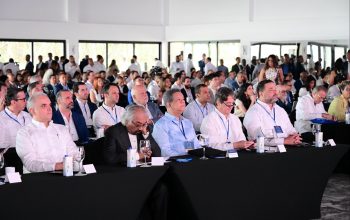news
GFDD and FUNGLODE Attend UN DESA Thematic Seminar Series on Chemicals in Preparation for the Eighteenth Session of the Commission on Sustainable Development
February 25, 2010
On February 23, Global Foundation for Democracy and Development (GFDD) and Fundación Global Democracia y Desarrollo (FUNGLODE) attended the United Nations Department of Economic and Social Affairs’ Thematic Seminar series on Chemicals, organized in preparation for the Eighteenth Session of the Commission on Sustainable Development (CSD), scheduled to take place May 3-14, 2010. The purpose
of the forum was to inform policy makers and other stakeholder on matters related to chemical safety and risk management.
Area experts emphasized the importance of chemicals in achieving social and economic goals, underscoring their use in water purification, healthcare, innovation, malaria nets, hybrid vehicles, textile and plastics manufacturing and solar technology.
The chemical industry, one of the largest global industries, expanding at a rate of
3-4% a year, directly employs 7 million people. Daily use of chemicals in textile and plastics manufacturing, pesticides, detergents and gasoline and other products and processes makes the need for global harmonized chemical assessment standards and risk management approaches vital to protecting human health and the environment. Area experts discussed the actions being taken by international bodies to ensure that these priorities are met.
The event featured keynote
speakers: Klaus Tyrkko, Policy Specialist, Montreal Protocol and Chemicals Unit, UNDP; Kei Ohno, Programme Officer, Stockholm Convention Secretariat; and Phil Snyder, Global Manager of Product Stewardship, Shell, and Member of the International Council of Chemical Associations (ICCA).
Panelists referred to the critical role of the following forums in developing a standardized global chemical safety strategy: the Rotterdam Convention PIC, the Stockholm Convention on
POPsi and the subsequent Conferences of Parties of the Stockholm Conventionii. The next one will be in Buenos Aires in 2010., the International Conference on Chemicals Management (ICCM), Inter-Organisation Programme for the Sound Management of Chemicals (IOMC), the UNED and the CSD (in particular Chapter 19 of Agenda 21).
Experts concurred that these
aforementioned entities are working to devise solutions and to scale-up best practices in the following areas:
- Incorporation of sound management of chemicals into overall national and international development plans
- Elimination or restriction of the production, use, import and export of Persistent Organic Pollutants (POPs)
- Chemical assessment and classification
- Processes of production that lessen
risks to human health and environment - Prevention of illegal trafficking of products that contain toxic chemicals
- Translation of information on chemical risks into language that is understood by development and finance ministries
- Raise awareness and quantify in economic terms the effects of unsound practices on human health and the environment
- Integration of toxicology and chemical risk assessment in
educational and professional training programs - Establish national and international governance processes
- Improve performance tracking and reporting
- Mobilize financial and technical assistance
Ms. Kei Ohno went a step further in her presentation by outlining the 12 initial POPs eliminated or restricted in 2004 as a result of the Stockholm Convention and the subsequent 9 that were agreed to be
eliminated or restricted in 2008 during the 4th annual Conference of POPs.
Ms. Ohno’s presentation identified the POPs addressed and the reasons behind many of the eliminations and restrictions.
Inititial 12 POPs addressed during Stockholm Convention (2004)
ELIMINATION:
Pesticides: aldrin, chlordane, dieldrin, endrin, heptachlor, mirex, toxaphene
Industrial chemicals:
hexachlorobenzene, PCBs
RESTRICTION:
Pesticides: DDT
REDUCE UNINTENTIONAL RELEASE: dioxin, furan
COP-4 (2008) – addition of 9 new POPs
ELIMINATION:
Pesticides: lindaneiii, alpha-HCH, beta-HCH, chlordeconeiv
Industrial chemicals:
hexabromobiphenylv, pentachlorobenzenevi , penta BDE, octa BDE
RESTRICTION:
Industrial Chemicals: PFOS, PFOS-Fvii
In terms of challenges that merit extra attention, experts called for expedited action in the areas of: education and professional training; knowledge dissemination;
risk management policy; scientific information and research; risk management models; and regulatory harmonization.
GFDD and FUNGLODE support the United Nations and its different agencies in carrying out their missions and achieving their goals. In 2004, GFDD and FUNGLODE were admitted to the United Nations System as institutions with consultative status, joining the Economic and Social Council (ECOSOC), the United Nations Conference on Trade and Development (UNCTAD), the
Department of Public Information (DPI), the Global Compact Office (UNGC), the Office on Drugs and Crime (UNODC) and the World Summit on the Information Society (WSIS).
GFDD and FUNGLODE attend seminars and conferences about issues impacting the global community in order to remain at the forefront of academic debate and network with renowned experts, as part of their mission to bring world-class programs concerning social and economic development and democratization to the
Dominican Republic.
Related links:
http://www.un.org/esa/dsd/susdevtopics/sdt_toxichemi_ss0210.shtml
http://www.undp.org/chemicals/
http://chm.pops.int/Secretariat/tabid/57/language/en-US/Default.aspx
http://www.pops.int
http://www.shell.com
___________________________________________
i As of February 2010, 169 countries ratified the Stockholm Convention. The Dominican Republic is amongst these countries.
ii The next one will be in Buenos Aires in 2010.
iii Lindane was previously used as a pesticide and to treat head lice and scabies, and is currently used in some countries to control termites, head lice and scabies. Alternatives exist, but are not readily available in some countries. Production and use for the treatment of head lice and scabies are exempted (Ohno presentation.)
iv Chlordecone was previously used as an agricultural pesticide, and is not currently being produced or used. Alternatives to chlordecone are now available (Ohno presentation.)
v Hexabromobiphenyl was previously used as a flame retardant in plastic for electrical appliances, textiles and other products. It
is not currently being produced or used. Alternatives to hexabromobiphenyl are available (Ohno presentation.)
vi Pentachlorobenzene was previously used in PCB products, fungicide and as a flame retardant, and currently could be used in the production of quintozene – a fungicide. It is unintentionally produced during combustion, thermal and industrial processes. Alternatives are
available (Ohno presentation.)
vii Perfluorooctane sulfonic acid (PFOS), its salts and PFOS fluoride were previously used, intentionally and unintentionally, in the production of electronic appliances, water-proofing for textiles and leather, photo imaging, coating for semi-conductors, use in certain devises and control of leaf-cutter ants. Some alternatives are available, but not for all
applications such as: coating for semi-conductors, photo-imaging, aviation hydraulic fluids and control of leaf-cutter ants (Ohno presentation).






